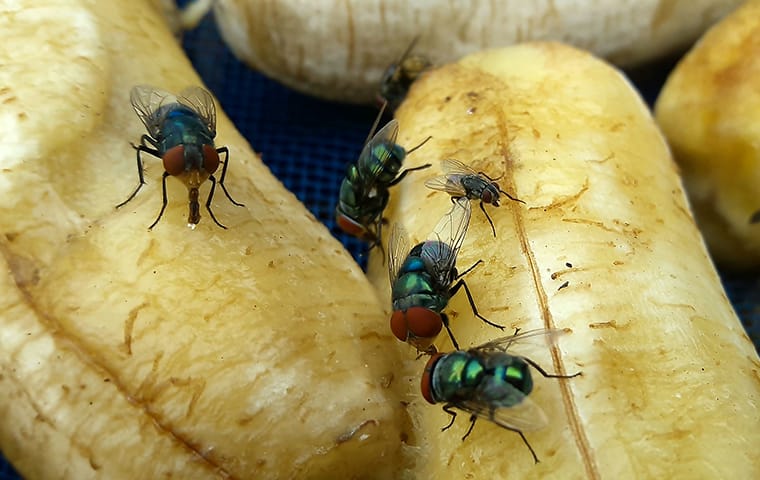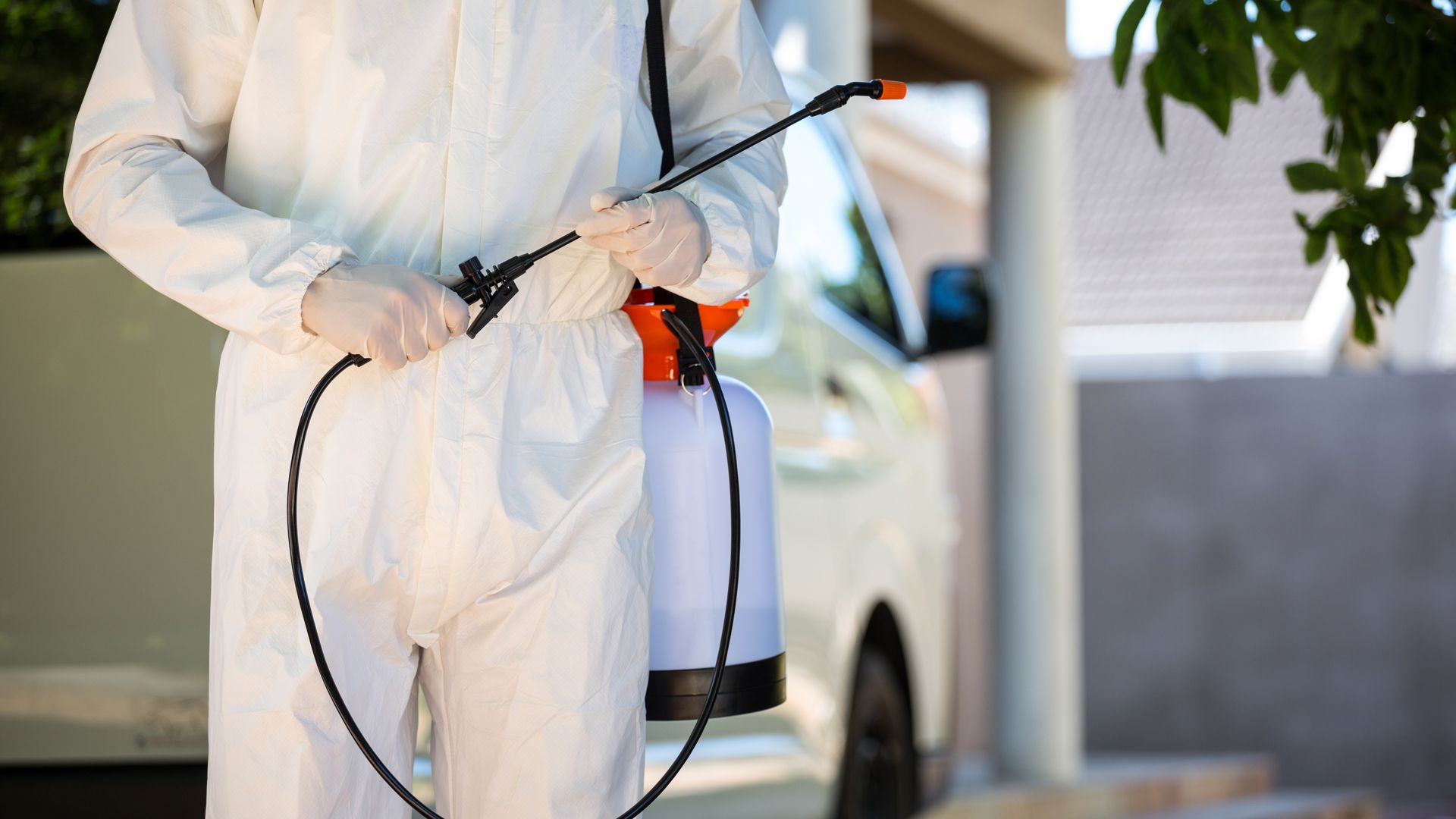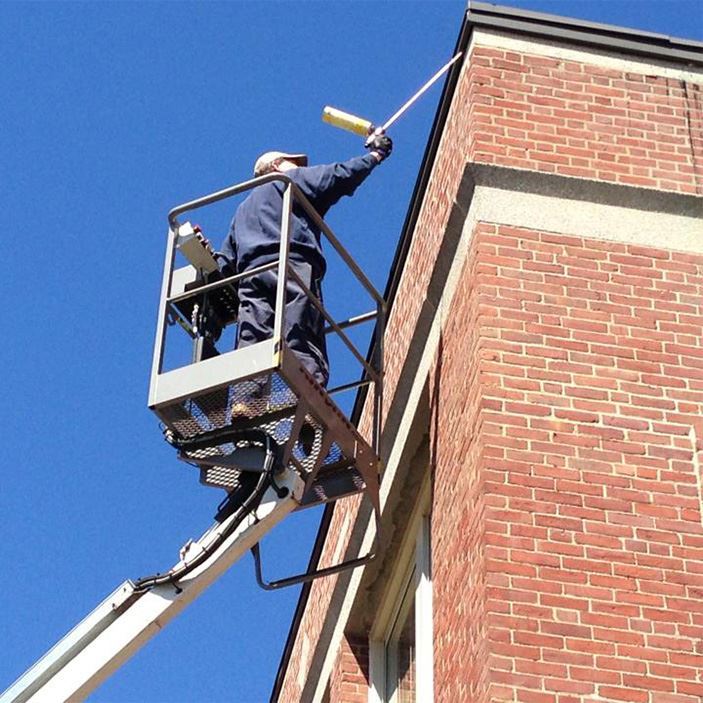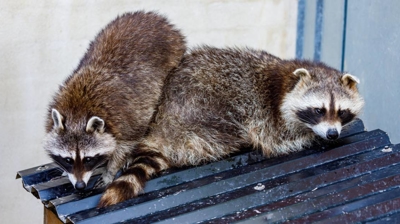
Fly Identification & Prevention
Understanding Flies: What You Need to Know

Flies are insects that play an essential role in nature. They are scavengers and help remove decaying plant and animal matter. Flies have unique spongy mouthparts because these insects don’t have teeth and can only consume liquids. When flies land on solid food, they release digestive fluids to liquefy the food so they can drink it.
Different species of flies that regularly find their way to and take over our Dover, NH, indoor and outdoor spaces include:
- Blow flies
- Bottle flies
- Cluster flies
- Drain flies
- Fruit flies
- House flies
Flies are prolific breeders. Depending on the species, female flies can lay hundreds of eggs at a time that can hatch in a matter of days. A few flies on your Dover, NH, property can quickly lead to a large, frustrating, difficult-to-eliminate infestation.
The Dangers of Flies: Health Risks Explained
Flies are dangerous pests because of the significant health risks they pose. These insects feed on decaying organic matter and come into contact with disease-causing parasites, viruses, and bacteria daily. When these pests are around our cooking, food prep, and dining areas, they spread pathogens that, if we come into contact with them, will cause food poisoning, respiratory problems, or otherwise make us ill.
Another reason flies are dangerous is that some species bite and consume blood meals. Fly bites can be very painful, lead to secondary infections, and their presence can make you wary of spending time in your yard.
Local Fly Exterminator Services in Dover, NH
In Dover, NH, dealing with fly infestations can be particularly challenging due to the area's unique climate and environment. The presence of nearby parks and recreational areas, such as the scenic Henry Law Park, can attract various fly species, making it essential for residents to stay vigilant. Local government resources, including the City of Dover's Health Department, provide valuable information on pest control and public health, emphasizing the importance of maintaining a clean environment to prevent fly breeding.
Residents often face pain points such as the rapid reproduction of flies, which can quickly escalate from a minor nuisance to a significant health risk. With the proximity to local farms and markets, food safety becomes a pressing concern, as flies can contaminate food sources and lead to health issues. Understanding the local fly population, including common species like house flies and fruit flies, is crucial for effective prevention and control.
Our fly exterminator services are tailored to the specific needs of Dover residents. We recognize the importance of addressing not just the immediate infestation but also the underlying factors that contribute to fly problems. By working with local resources and understanding the community's unique challenges, we can help you reclaim your home and outdoor spaces from these pesky invaders. Whether you're dealing with a sudden outbreak or looking for long-term prevention strategies, our team is here to assist you in keeping your environment fly-free.

Why Choose Dependable Pest Solutions?
-
IPM MethodologiesDependable Pest Solutions uses an Integrated Pest Management (IPM) approach to resolve most major pest issues. This ecologically sound solution prioritizes safety through prevention, monitoring, and education.
-
Licensed ProfessionalsOur trained technicians are knowledgeable and experienced pest management professionals who understand the importance of discretion, safety, and professionalism.
-
Trusted by the Community Since 2007Rest assured knowing your pest problems are under control with a locally owned and operated company backed by over 17 years of proven experience.
-
Woman Owned Local BusinessFounded by a licensed entomologist, our owner is committed to addressing the industry deficiencies and continues to grow a professional pest control company held to the highest standards.
What Our Customers Are Saying
-
"Very pleased!"
The technician from Dependable Pest Solutions was great today. He did a thorough inspection of all the bait sites in my home. He gave me a comprehensive verbal report of his findings and the additional work he did to get my home pest free.
- Debora L. -
"Can’t recommend them enough!"
Yesterday we discovered a massive wasp nest hanging over our driveway. I called Dependable Pest this morning, and the nest has already been removed. They were friendly, affordable, super quick and communication was excellent!
- Dawn C. -
"Bill always does a great job!"
He is very knowledgeable and friendly! I have been a client of Dependable Pests for many years and my parents were for many years before that. Always satisfied with their work and customer service.
- Michelle -
"Bill is top-notch!"
Bill is top-notch & professional! I had ball park hornet's nest outside my widow. I spoken to Stephanie who provided me with great service, and she contacted Bill! He was able to see me the same day! Thank you!
- Fay L. -
"Very punctual, communicative, and thorough."
I had a serious wasp problem around my entire property. These guys come spray twice a year and it has completely resolved the issue.
- Kyle K. -
"They're communication is great!"
I would highly recommend Dependable Pest Solutions. We’ve had issues with ants on our vacation property. They come right out and take care of the problem. Their communication and follow up is great!
- Jane E. -
"Highly recommend!"
We love Dependable Pest Solutions and have used them for several years. They are amazing, and their customer service is top notch. We can call anytime and someone will be out shortly to help with whatever it is we need.
- Shannon B. -
"Would recommend them - 100%!"
Dependable Pest Solutions has been reliable, professional and fairly priced. Brought them in for rodent extermination and have since signed up for monthly services!
- Tyler W.
Why Do I Have a Fly Problem?
Flies are attracted to our Dover properties because they offer an almost neverending supply of food, water, places to lay their eggs, and shelter.
When flies have easy access to garbage, crumbs on tables, decaying fruits and vegetables in gardens, and animal excrement, they will take advantage and take over our properties.
In addition to food, moisture attracts flies. Flies love to lay their eggs in damp soil and decaying organic matter. Properties with poor drainage, clogged drains, and leaky pipes and fixtures attract the attention of flies.
Furthermore, the root cause of a fly problem can be a mouse or other small animal getting into your home and dying behind its walls. Flies will swarm to the decaying animal and use it as a feeding and breeding site.

Where Will I Find Flies?
Flies breed with vigor during periods of warm weather and, in Dover, are most problematic during the spring and summer seasons. When flies live in large numbers in our yards near our homes, they can easily get into our houses through drains, vents, open doors, windows, or other small openings they discover.
Once inside your home, flies, depending on their species, will hang out in several different areas. Clogged drains, wall voids with leaky pipes, garbage cans, windowsills, and lights are places flies gather and become a problem.
How do I get rid of flies?
Flies are annoying insects. They live outside all around us in large numbers, making it seem impossible to keep flies away from your home. Yet, by implementing regular home pest control services, you can quickly eliminate your current fly problem and ensure they won’t take over your property in the future. Fly control is easy and stress-free when you partner with a professional!
Here at Dependable Pest Solutions, we offer a high level of service that you can count on and the peace of mind of knowing we will solve your home’s pest problems. For the most effective pest control solutions in Dover, NH, reach out to Dependable Pest Solutions!

.2511261116088.png)





